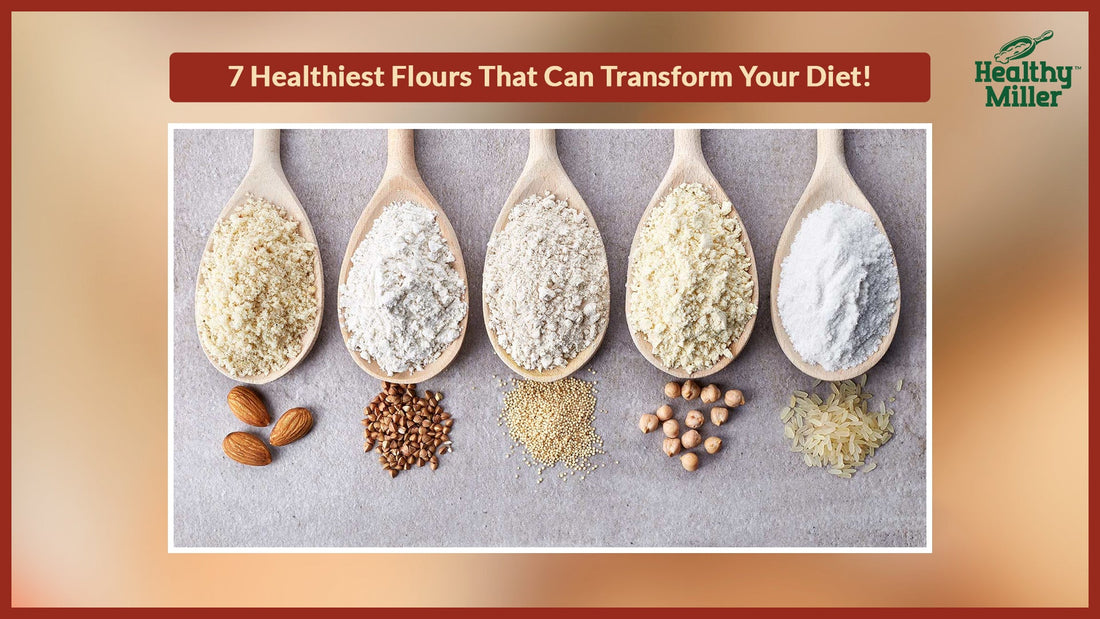
7 Healthiest Flours That Can Transform Your Diet (And Help You Lose Weight)
Share
Flour is a staple ingredient in most kitchens, especially in Indian households. Whether it's for roti, paratha, pancakes, or baked goods, flour is used almost every day. But not all flours are created equal. Some are processed, low in nutrients, and may even contribute to weight gain, diabetes, and poor digestion.
If you’re looking to eat healthier, lose weight, or manage a health condition like diabetes or gluten intolerance, switching to healthier flours is a smart choice.
In this blog, we’ll explore the top 7 healthiest flours you should be using in your kitchen and how they can benefit your overall well-being.
1. Whole Wheat Flour (Atta)
Best for: Everyday cooking, chapati, paratha
Whole wheat flour is one of the most common flours used in Indian households. It's made by grinding the entire wheat kernel, which means it retains its fiber, B vitamins, and minerals like iron and magnesium.
Why it’s healthy:
-
Rich in dietary fiber, which supports digestion and weight loss
-
Lowers the risk of type 2 diabetes
-
Helps maintain stable blood sugar levels
2. Ragi Flour (Finger Millet)
Best for: Diabetics, kids, weight watchers
Ragi, or finger millet, is a super grain known for its high calcium and fiber content. It's a great alternative for those looking to cut down on carbs or manage blood sugar.
Why it’s healthy:
-
Gluten-free
-
High in calcium — great for bones
-
Contains tryptophan, an amino acid that helps control appetite
3. Besan (Chickpea Flour)
Best for: Pakoras, cheelas, gluten-free baking
Made from ground chickpeas, besan is a versatile and protein-rich flour. It's perfect for those who are gluten intolerant or looking to increase plant-based protein intake.
Why it’s healthy:
-
High in protein and fiber
-
Naturally gluten-free
-
Lowers bad cholesterol (LDL)
4. Jowar Flour (Sorghum)
Best for: Gluten-free rotis, khakhras, bhakris
Jowar is a millet and an excellent option for people avoiding gluten. It’s rich in nutrients and is a traditional grain used in many Indian states like Maharashtra and Gujarat.
Why it’s healthy:
-
Helps in weight management
-
Packed with antioxidants
-
Improves digestion
5. Bajra Flour (Pearl Millet)
Best for: Winter recipes, rotis, thalipeeth
Bajra is another ancient grain that is loaded with essential nutrients. It’s perfect for colder months as it helps keep the body warm.
Why it’s healthy:
-
High in iron and magnesium
-
Supports heart health
-
Lowers blood pressure
6. Oats Flour
Best for: Pancakes, muffins, dosa, healthy baking
Oats flour is made by grinding rolled oats or steel-cut oats into a fine powder. It’s a favorite among fitness enthusiasts and health-conscious eaters.
Why it’s healthy:
-
Rich in soluble fiber (beta-glucan) that helps reduce cholesterol
-
Supports weight loss and gut health
-
Keeps you full for longer
7. Amaranth Flour (Rajgira)
Best for: Fasting foods, rotis, laddoos
Amaranth, or rajgira, is a lesser-known grain but extremely nutritious. It’s a gluten-free pseudo grain and used widely during religious fasts in India.
Why it’s healthy:
-
Rich in protein, especially lysine — an amino acid often missing in other grains
-
High in calcium, iron, and magnesium
-
Great for bone strength and anemia prevention
Conclusion
Choosing the right flour can make a big difference in your health. From improving digestion and boosting immunity to supporting weight loss and managing diabetes, the flours you use daily play a major role in your well-being.
Instead of relying on just one flour, try rotating between 2–3 different types to get a wide range of nutrients. At HealthyMiller, we believe in bringing back traditional grains in their most natural form—stone-ground, chemical-free, and fresh.
Make the switch today and bring wellness to your plate with the healthiest flours nature has to offer.
